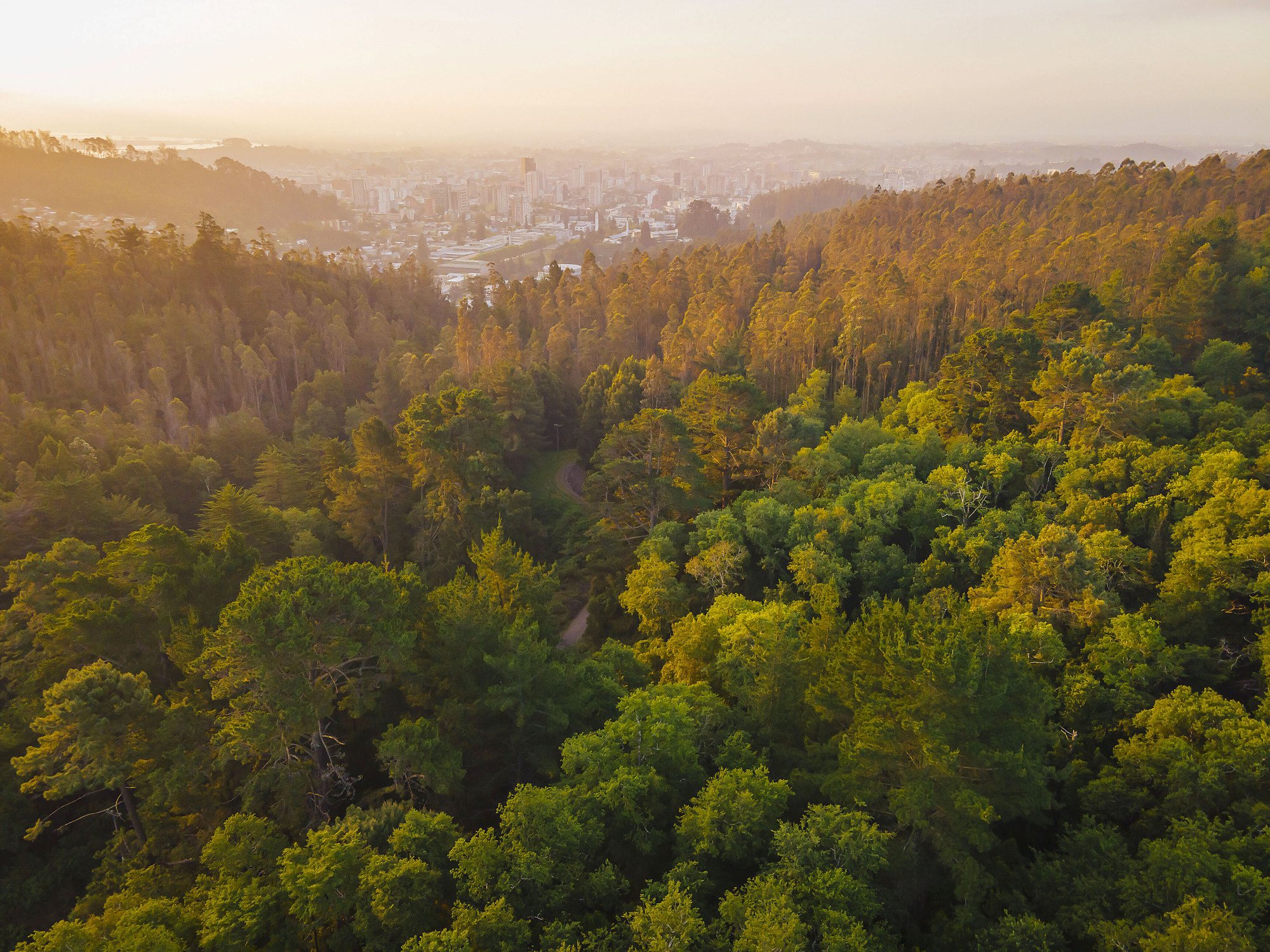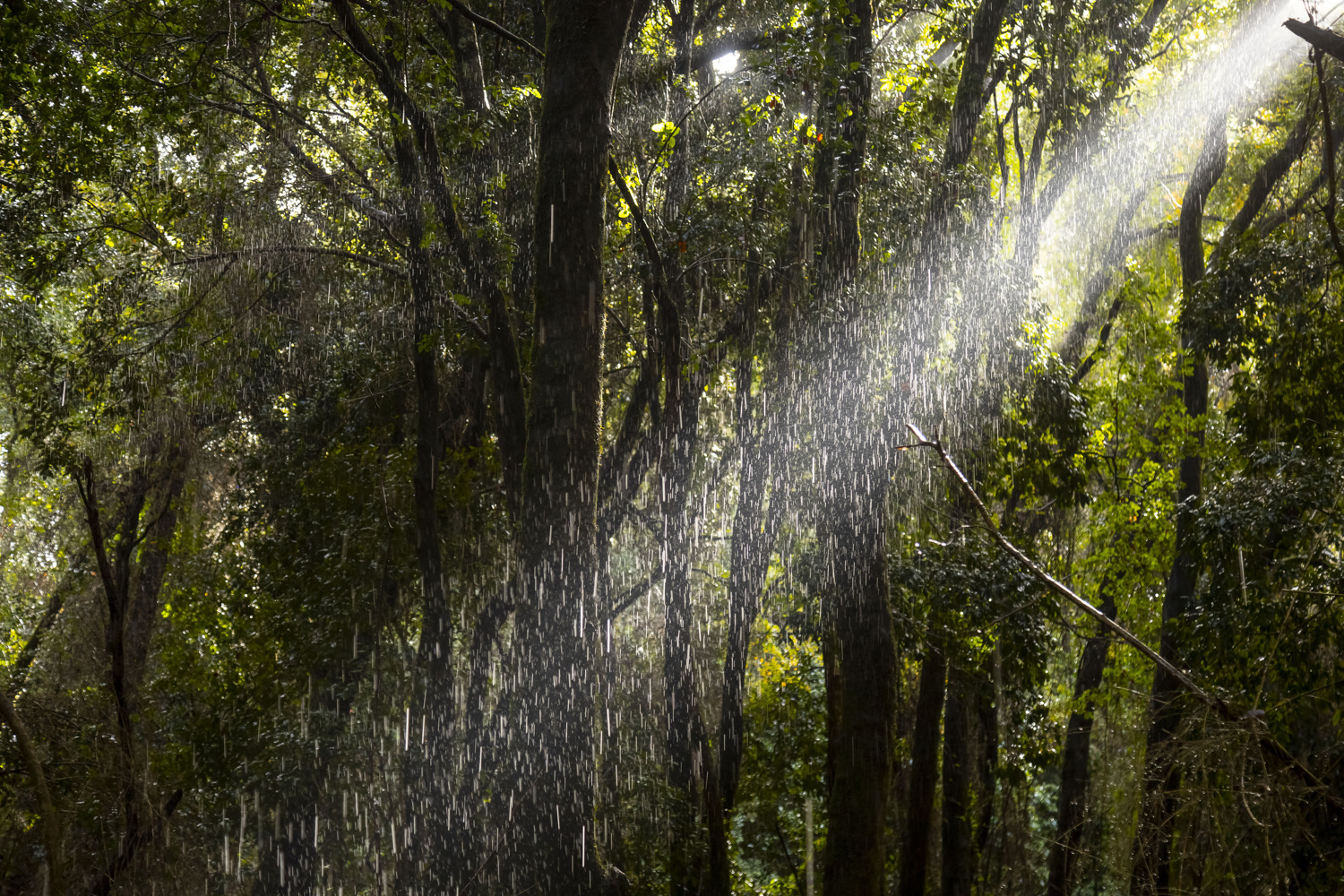Project Campus Naturaleza UdeC Celebrates One Year of Life

Various actions marked the first year of a project based on science and the benefits that nature provides to humans. The unprecedented initiative by the University of Concepción aims to consolidate its governance model, community engagement, and biodiversity conservation, among other aspects.
An exhibition and projection of images on the façade of the Faculty of Chemical Sciences commemorated the first year of the Campus Naturaleza Universidad de Concepción project. The photographs, depicting significant events since before the project's launch in May 2023, were combined with a selection titled "Threatened Ecosystems of Chile" by the experienced national photographer Guy Wenborne Huyghe to provide the thematic context for the activities.
The Campus Naturaleza project will conserve 25 hectares of native ecosystems on land adjacent to the UdeC Heritage Campus, made up of remnants of deciduous forests in Concepción and aquatic ecosystems. In addition, ecological restoration, human well-being, mental health and ex situ conservation (botanical garden) actions will be carried out, the first phase of which is already underway.
Regarding the activities, the Rector of the University of Concepción, Dr. Carlos Saavedra Rubilar, emphasizes that "this exhibition precisely engages with a change in the perception of nature and its objectives. It invites us to reflect on the importance of preserving Chile's native ecosystems and raising awareness about the threats they face, such as deforestation and climate change."
He adds, "The timing could not be more appropriate, not only because we are celebrating the institutional anniversary or because last weekend we celebrated Heritage Day, but above all because our country is in what we call ecological overshoot, making it the first Latin American country to reach this level of deficit, something we know is not good news. However, we will continue to contribute from our natural and intellectual spaces to be a country that vindicates the importance of nature, enhancing it and bringing it to its rightful place."
Similarly, the Vice-Rector for Economic and Administrative Affairs, Dr. Miguel Quiroga Suazo, institutional sponsor of the project, indicates that the initiative has a value "that goes beyond the direct impact it may have on conservation and biodiversity, and therefore on the objectives of sustainable development. That is the possibility of conserving and preserving these unique spaces for future generations. Its greatest value comes from the possibility of developing a project that can reconcile the development of academic activity and our mission with nature conservation, contribute to the well-being of communities and development, and become a meeting point and interaction between man and nature."
He also adds, "This initiative is closely linked to the mission, values, and objectives contained in our institutional strategic plan, and aspires to consolidate and become the university's fifth campus. From this perspective, it not only aspires to generate cutting-edge and impactful science but also to contribute to the training of new professionals and scientists, to continue connecting with our territory, and to help position us as one of the leading universities in this field worldwide."
Unique Project
Campus Naturaleza is a unique project at the national level, and regarding this, its director, Dr. Cristian Echeverría Leal, explains that, given this singularity, it was necessary to articulate a governance model to include all relevant actors. "There are advisory bodies such as the Technical Advisory Committee, which provides support from experts in various fields of university knowledge. There is also the Mixed Advisory Council, composed of 12 actors from different areas of local activities, which aims to integrate the community in a pioneering way. Similarly, and composed of members of the Board of Directors of the Corporation (UdeC) and the Academic Council, the Mixed Commission was established, which is responsible for making final decisions," he explains.

The academic emphasizes that, even before the launch at the end of May 2023, work began on different facets that are now fundamental pillars of the project. "The baseline survey and subsequent biodiversity monitoring allowed us to characterize the existing native species on the UdeC property, as well as their distribution, among other indicators. On the other hand, the outreach program has given us the opportunity to involve and engage the support of various local actors and to visualize collaboration opportunities within and outside the university, addressing different audiences, and informing about the project's characteristics long before the launch."
The native ecosystems, fragile and irreplaceable, contain unique tree species that serve as a transition between the forests of the central and southern zones of the country. For this reason, the community plays a central role in ensuring their long-term survival, as Dr. Echeverría comments. "The project relies on the collaboration of the community, which is why a guided tours program was established, which was very successful in 2023. This program allows people to visit the main remnant of coastal native forest just minutes from the city in an orderly manner and with project monitors. This way, we ensure that the community gets to know these spaces without altering the habitat of the different species that exist there."
The guided tours also contribute to the development of another line of action. "Different scientific studies conclude that constant contact with the natural environment brings benefits to people. The project also has a unit focused on integral health and biocultural environmental education, which also integrates children from nearby kindergartens. This is a pilot for nature education for early childhood, which addresses various objectives such as emotional bonds with nature, development of physical, intellectual, social, and emotional skills, among others," emphasizes the academic.
Assumes New Deputy Director
In early May of this year, Dr. Andrea Fernández Covarrubias, a faculty member of the Faculty of Architecture, Urbanism, and Geography at the University of Concepción, assumed the deputy directorship of the project, replacing Dr. Cristóbal Pizarro P., who coordinated the outreach area in the project's first phase, among other tasks. "I hope to contribute to the Master Plan process and to the challenge of making the interaction with the community visible, from an integrative perspective. Likewise, to continue the community engagement processes that the previous deputy director was developing. In this sense, I highlight the importance of involvement with the community, since this space is located in a very powerful and consolidated social environment."
In the perspective of the challenges, she indicates that "among the most relevant aspects is the understanding of urban-ecological interaction. How connections between nature and the built environment will be established facing the future, as the closeness and proximity of this natural space to the city have the potential to increase the relationship with its inhabitants and also highlight the basic interrelationships and environmental characteristics of our territory. This opportunity is undoubtedly one of the relevant purposes that this project will grant to the city, the region, and the country. Its scopes are in a currently unknown dimension because there is no space with these characteristics of naturalness and proximity to the city."
Meanwhile, Dr. Cristian Echeverría highlights one of the latest actions carried out in December 2023, which combined the components of outreach and biodiversity conservation: the first release of two monito del monte specimens(Dromiciops gliroides) affected by the fires of the summer of 2023, on the grounds of Campus Naturaleza, together with the Agricultural and Livestock Service (SAG) and the Wildlife Rehabilitation Center of UdeC. "Campus Naturaleza is being seen as a place that will ensure the continuity of certain species in the future, as a space that safeguards local biodiversity, where it is possible to receive wildlife damaged by human-related factors, such as fires or habitat destruction."
On the other hand, the preparations for the establishment of the first botanical garden of the University of Concepción are actions that will mark the project in this 2024, explains Dr. Echeverría. "The first phase of the eucalyptus plantation harvest, which is already underway, is necessary to have an area to implement the first ex situ collection of threatened Nothofagus species in Chile (botanical garden). Ex situ conservation refers to the conservation of threatened tree species outside their natural distribution and which may not survive due to the climate crisis and alterations produced by humans. For this reason, ex situ conservation is a synonym for a lifeline, which will allow us to conserve species native to the Metropolitan, O'Higgins, and Maule regions and bring them to Campus Naturaleza, in a task that is complex from a technical point of view but that awakens all hopes from a scientific and also human point of view, as it aligns with the university's objectives of leaving a biocultural legacy for future generations," concludes the academic.


